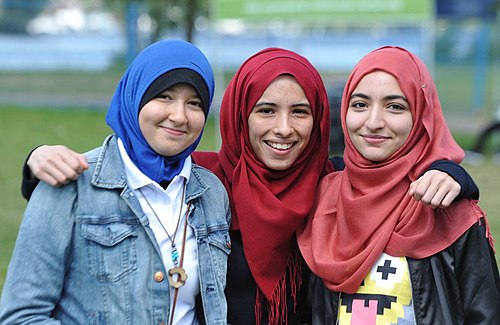In recent years, debates surrounding religious symbols and attire—particularly the hijab—in public spaces across Western nations, including the UK, have become increasingly contentious.
While diverse perspectives exist, Islamist groups have played a dominant role in shaping these discussions, framing the hijab as both a religious identity marker and an act of cultural resistance. This analysis explores the influence of Islamists in Britain, while also highlighting the positive values the hijab embodies in the modern era.
by: Faeze Aghamohammady
The Role of Islamists in Promoting the Hijab in Britain
Islamist groups in the UK have leveraged initiatives such as World Hijab Day and cultural-educational campaigns to normalize the hijab as an expression of faith and cultural heritage. By asserting that the hijab is not merely a piece of clothing but a symbol of conviction and authenticity, these groups have sought to integrate it into public life.
Examples include distributing free headscarves at events and erecting statues of veiled women—efforts that, despite criticism, have effectively positioned the hijab as a legitimate religious choice. Additionally, Islamists have countered accusations of Islamophobia, creating space for open dialogue on religious attire.
Hijab as a Symbol of Resistance Against Liberalism
Notably, some British strategists have acknowledged that the hijab represents a form of female resistance against liberal secularism and consumerist Western norms. Studies of Muslim-majority societies suggest that the hijab is not a symbol of oppression but a powerful tool for reinforcing individual and collective identity.
Women who choose the hijab send a clear message: they reject homogenized Western standards and assert their right to preserve their values. In an era of globalization, the hijab thus functions as a cultural counter-narrative, challenging imposed secular-liberal frameworks.
The Hijab: A Symbol of Faith and Inner Freedom
While critics often frame the hijab as oppressive, this perspective overlooks its deeper spiritual, cultural, and social dimensions. Key benefits include:
- Religious Devotion & Spirituality
For many Muslim women, the hijab is an act of worship—a visible commitment to faith, particularly in secular societies where spiritual values are marginalized. - Preserving Dignity
By shifting focus from physical appearance to character, the hijab helps women navigate public spaces with reduced objectification. - Resistance to Cultural Homogenization
In an age of consumerist globalization, the hijab asserts cultural autonomy, resisting assimilation into dominant Western norms. - Empowerment & Self-Definition
Contrary to stereotypes, many hijab-wearing women report greater confidence, freed from societal pressures to conform to beauty standards. - Fostering Meaningful Connections
In multicultural societies, the hijab can serve as a bridge, facilitating dialogue based on shared values rather than superficial judgments.
The hijab remains a defining element of religious and cultural identity for Muslim women. In Britain, Islamists have played a pivotal role in reframing it as both a personal choice and an act of resistance. Meanwhile, recognition by some Western analysts that the hijab challenges liberal norms underscores its significance beyond mere attire. Rather than politicizing the issue, constructive dialogue should center on its spiritual and social value—ensuring space for diverse voices in an increasingly pluralistic society.


